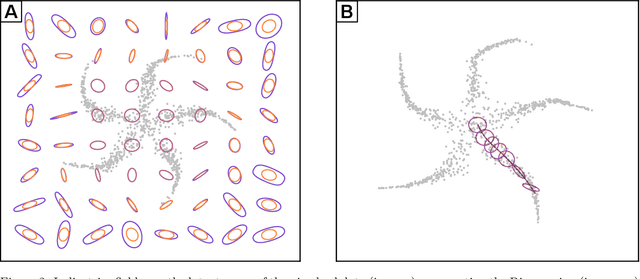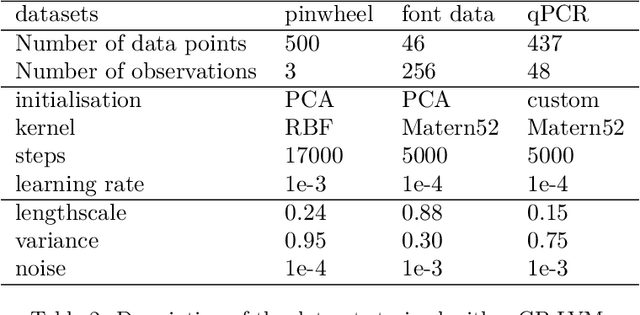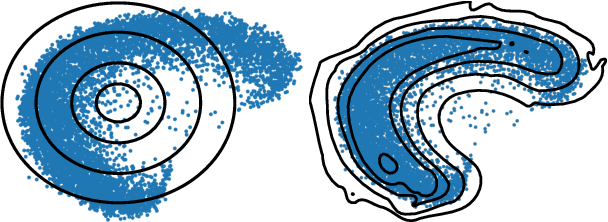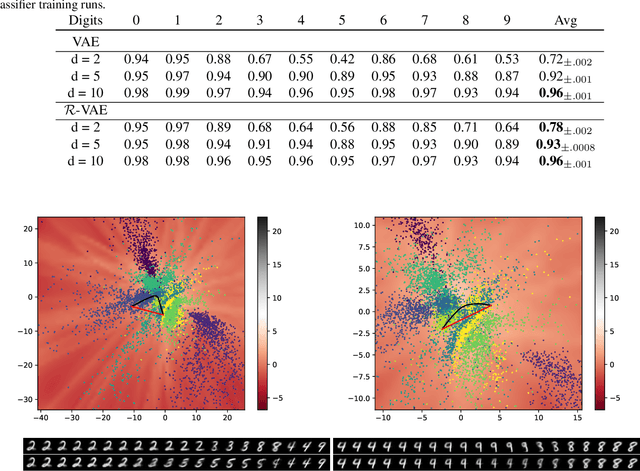David Eklund
Certifying Robustness via Topological Representations
Jan 18, 2025



Abstract:We propose a neural network architecture that can learn discriminative geometric representations of data from persistence diagrams, common descriptors of Topological Data Analysis. The learned representations enjoy Lipschitz stability with a controllable Lipschitz constant. In adversarial learning, this stability can be used to certify $\epsilon$-robustness for samples in a dataset, which we demonstrate on the ORBIT5K dataset representing the orbits of a discrete dynamical system.
Identifying latent distances with Finslerian geometry
Dec 20, 2022



Abstract:Riemannian geometry provides powerful tools to explore the latent space of generative models while preserving the inherent structure of the data manifold. Lengths, energies and volume measures can be derived from a pullback metric, defined through the immersion that maps the latent space to the data space. With this in mind, most generative models are stochastic, and so is the pullback metric. Manipulating stochastic objects is strenuous in practice. In order to perform operations such as interpolations, or measuring the distance between data points, we need a deterministic approximation of the pullback metric. In this work, we are defining a new metric as the expected length derived from the stochastic pullback metric. We show this metric is Finslerian, and we compare it with the expected pullback metric. In high dimensions, we show that the metrics converge to each other at a rate of $\mathcal{O}\left(\frac{1}{D}\right)$.
Variational Autoencoders with Riemannian Brownian Motion Priors
Feb 18, 2020



Abstract:Variational Autoencoders (VAEs) represent the given data in a low-dimensional latent space, which is generally assumed to be Euclidean. This assumption naturally leads to the common choice of a standard Gaussian prior over continuous latent variables. Recent work has, however, shown that this prior has a detrimental effect on model capacity, leading to subpar performance. We propose that the Euclidean assumption lies at the heart of this failure mode. To counter this, we assume a Riemannian structure over the latent space, which constitutes a more principled geometric view of the latent codes, and replace the standard Gaussian prior with a Riemannian Brownian motion prior. We propose an efficient inference scheme that does not rely on the unknown normalizing factor of this prior. Finally, we demonstrate that this prior significantly increases model capacity using only one additional scalar parameter.
Expected path length on random manifolds
Aug 20, 2019



Abstract:Manifold learning seeks a low dimensional representation that faithfully captures the essence of data. Current methods can successfully learn such representations, but do not provide a meaningful set of operations that are associated with the representation. Working towards operational representation learning, we endow the latent space of a large class of generative models with a random Riemannian metric, which provides us with elementary operators. As computational tools are unavailable for random Riemannian manifolds, we study deterministic approximations and derive tight error bounds on expected distances.
 Add to Chrome
Add to Chrome Add to Firefox
Add to Firefox Add to Edge
Add to Edge